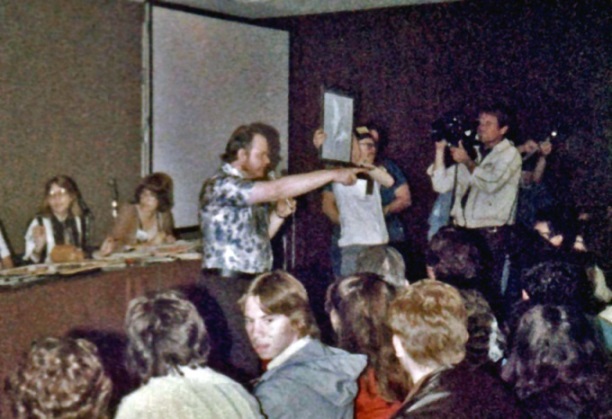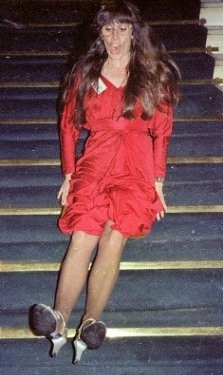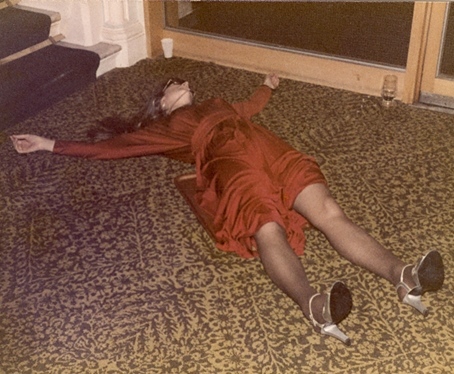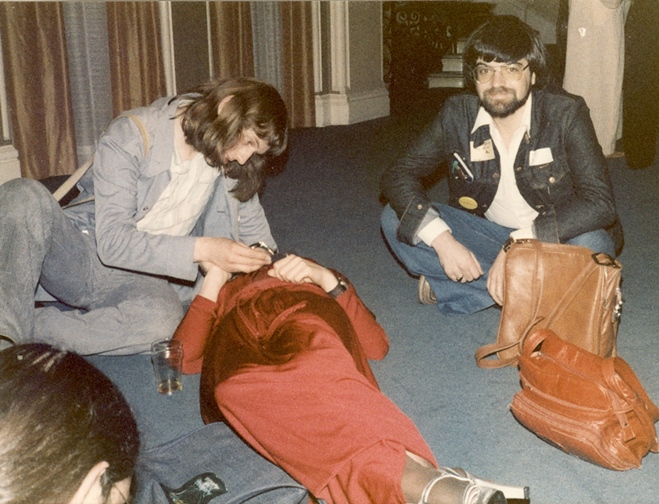Tuesday 28th August & afterPETER WESTON:The only other time I saw Fred [Hutchins] was at breakfast on the Tuesday morning, when he came up to our table with a slightly puzzled expression on his face. "Excuse me, Mr Weston," he said, "but do you know anything about a nine-foot tower of beercans that seems to have been piled against the wall in the Norfolk Room?" "Not a thing", I assured him blandly, shaking my head. "what do these science fiction fans get up to!" Once the Opening ceremony was out of the way that little altercation with security [on Friday] was about the only time I actually had anything to do all that weekend. We'd worked on the principle of section heads taking total responsibility for their areas, which they did, and North=East fan Kevin Williams acted as Operations Manager, a job he performed superbly. As a result I was completely superfluous to requirements, reduced to popping into the Ops Room once or twice a day to ask hopefully, "Anything gone wrong?" only to be repeatedly disappointed.
ELI COHEN: I really should do a Seacon report. But if I do, I'll never get around to mailing comments. Not that there's that much to tell about the convention itself. I mean, who wants to hear about Cas Skelton sliding down the Metropole stairs on a tray? Or a hysterically funny BBC radio series called "A Hitchhiker's Guide to the Galaxy" ("Going into hyperspace is an awful feeling -- like being drunk." "What's so awful about being drunk?" "Ask a glass of water.")? Or Dave Langford trying to teach me how to pronounce TWLL DDU? Or Janet and Ricky Kagan dropping half-a-bottle of Remy-Martin cognac in my lap at a party the night before they left ("You don't expect us to take it back to the U.S., do you? Enjoy.")?
PETER NICHOLLS: The convention was simply too big for any single observer to give a coherent report of it, though interestingly enough, it had very much the same feeling as earlier, successful Eastercons (Coventry in 1975, Leeds in 1979, for example), with the same sort of lift parties, stair parties, obligatory glimpse of Brian Burgess's wholly disgusting nether parts, and so on, even though the programme side of things was so very much more highly organized than ever before, with fandom showing an alarming capacity to spawn NCOs on demand, and a number of willing enlisted men of lower ranks as well. Weston, as Field Marshal, was no more offensive than had been generally anticipated, and layabout Colonel Leroy Kettle showed a capacity for hard work that will get him into terrible trouble if he ever reveals it again. The Metropole Convention Manager had sworn, so Pete Weston told me, that it was impossible for the lager to run out. "We've got 3,000 pints on tap." It was with a feeling of great accomplishment, then, that we observed it actually to run out, quite soon, more especially as the Americans were by and large more sober than the British, and this feat of hard drinking was definitely down to Motherland with some assistance from Empire.
Peter's fellow countryman Merv Binns, his palate having tragically been ruined by years of exposure to nothing but lager, was unable to appreciate real beer writing: "Some of the stuff they call beer is almost undrinkable by Australian standards." A sad case. TERRY CARR: I checked out of my hotel, took a walk on the one Brighton pier (of two) that wasn't yet condemned as unsafe, and drove up to London with Malcolm and Chris Edwards, at whose house I was to spend two days while I chatted up London editors and publishers, did a little touristing, etc. Unfortunately, the first evening there I came down with one of those 36-hour killer flus, so I missed most of Chris Priest's "canine zombie" party, and a big luncheon for editors and writers the next day, and never got any touristing at all done. So much for my earlier self-congratulations on my carefully maintained good health. Thursday morning, the first time I felt halfway competent to live, I caught a plane for home. (Before I became unbearably ill Tuesday night, Chris did take me through the garden behind his apartment [in Ortygia House] to the vast field beyond a line of trees. "This is where World War II was won," he said. Remembering a little history for a change, I asked, "You mean this is the playing field of Eton?" "No, I'm afraid it's only the playing field of Harrow, but Churchill mentioned both, you know." So I guess I did get to see one of the historic sights of London after all.) I read an issue of Analog on the way home, but it struck me as pretty dull stuff after the excitement of England's largest convention.
MIKE DICKINSON: As grievously damaged braincells order themselves into some lumpish semblance of normality I must confess that I have just spent (Wednesday to Tuesday) the best week of my life. Some of the credit must go to the con committee, especially Peter Weston, whose new talent for pleasant silliness must be kept up, and the superbly organized Kevin Williams. The speakers also deserve credit, although I suspect that the only one I'll always remember is the saint-like Sturgeon, whose spoke more good sense about important things than I've ever heard in so short a time. However, programme events are not vital to the life of the con: the people are, and I met more new people who were open, friendly and interesting than I could expect in a year's mundane activity. In fact I believe I have made several friends and if anyone can suggest a better way of passing a week than that he is welcome to his suggestion. Of course I am referring to Americans. I came to the con with a slightly nervous curiosity, after all that had been stated in zines beforehand about how different from us they were. I knew there were some I wanted to meet, whom I wanted to be more than just names: all were charming, especially the amazing Joyce Scrivner and Terry Hughes-- a one-man justification of TAFF. However it was the ordinary American fan-in-the-con which was the revelation. They treat the convention like a holiday in the Mardi Gras sense-- normal rules do not apply. Liberated women in appreciable numbers, a cheap and plentiful supply of the finer things in life and a cultivation of silliness (I remember the disappointment expressed that Phil Foglio did not wear his moose antlers for the Hugo awards) help, but where was the paranoia and drunken belligerence? Surely it is not possible to run a con without them. Perhaps again those liberated women make a difference and even Kevin Smith will agree that men don't exactly suffer. A final myth to dispose of-- American authors are no more stand-offish than British. For every Pournelle there are several fans who (like Rob Holdstock) also write professionally, such as the Haldemans and the Eisensteins. Thanks to the organizers, thanks to the people I met, especially thanks to the good fans of Chicago and Minneapolis: I'll see you there sometime. Let's do it again.
KEVIN SMITH: What's to get excited about? You seen one Worldcon, you seen 'em all. That may or may not be true; it is highly irrelevant. Seacon '79 was my first Worldcon, so not for me the blase, seen-it-all attitude of the experienced American Worldcon-goer. I've been to British cons, of course-- since 1972--- and I've even chaired an Lastercon (Skycon in 1978), but the Worldcon was going to be different, wasn't it? And I was all excited about it. So was most of British fandom. It was going to be BIG, for one thing, and so it turned out. It was seven times as big as the previous biggie, Skycon. There were going to be foreigners there, too. We've had foreigners before, but only in small, easy-to-handle numbers. At Seacon, we Brits were outnumbered by foreigners-- about three to one. It was going to be expensive-- despite Mr Weston's protestations a couple of years ago. Expensive rooms, expensive booze, expensive food, and for a couple of days longer than British cons usually last. But by saving up for months beforehand and staying in a little hotel near the Metropole rather than at it, the wallet managed to stand the strain, just. Me too. And the feel of it was going to be different. This was a Worldcon, damn it, not just any old British con! And there the predictions, or expectations, fell apart. The feel of Seacon was not different; it was familiar. I felt at home. So was the whole thing a waste of time and money, then? No, no, a thousand times no! The feel was fannish and familiar, but there were lots of new people who fitted in and contributed to it. Legendary American fans and unknown British neos-- I was meeting both for the first time---added enough vitality to break up the established rounds of British fandom without ruining its fannish ambience. It was great, I tell you! But don't ask me how life was outside the fanroom.
Same here. Mostly. DAVE LANGFORD: Ah, Seacon! The helium filled bin liners rising in the stairwell; Cas Skelton in shorts with a helium balloon tied to the zip; such luminaries as D.West falling-down drunk before the con ever started (Hazel wanted to know whether his strange locomotion was a new dance); people at the info desk asking when was the next plane from Zagreb or how to find 'Hall 13'and the Astral Leauge initiation; Dave Piper gaping as 'Superman' signed 5,271,009 autographs “You'll believe a man can write!" (Jim Barker's strongest memory of Seacon is of being totally ignored by Christopher Reeve...); Peter Weston explaining how FGoH Harry Bell was a great fanartist, to an audience of thousands, none of whom admitted to having seen the Bell progress report covers - "There'll be a special display of Harry's work in the fan room," Peter shrieked in desperation, and we fan-room hangers-on went running to concoct some such display while all the time, over Peter's head, was Harry's Seacon logo blown up to 30 feet square, but never once did he think of pointing up...
To pass on a rumour in the fan-room was like shouting in some immense cavern: after a disconcerting long interval the echo returns, weirdly distorted by its reflections along all the halls and corridors of the Metropole. Thus the great "American Riffraff" story: if Joyce Scrivner has got it right, the phrase was used sotto voce by a 'snooty British lady' as she informed US fan Jane Hawkins that this here party was by invitation only, and so on. By the time the rumour-mills had finished, the phrase was on the lips of Vonda McIntyre's publishers as they brutally hurled her from their select gathering; a security man was said to have spat "American riffraff" at Karen Anderson whilst barring her from the party where hubby Poul and the SFWA were disporting themselves; "American Riffraff" badges sprouted like mushrooms; an international incident seemed imminent, but nothing much actually happened. Still wilder rumours were flying when the con was over: Charles Platt had denounced Chris Priest to SFWA as being responsible for mockery of their members via the Jacqueline Lichtenberg Appreciation Society! Jerry Pournelle had offered physical violence to Charles Platt! Marion Zimmer Bradley and others were working to have Chris Priest drummed out of SFWA! Ted White was to become editor of Heavy Metal at $50,000 per annum! Greg Pickersgill and Simone Walsh had split up! A. Kaveney had changed sex! It seemed that Seacon had distorted our sense of reality forever. All those post-con rumours proved to be true. Help. KEV WILLIAMS: Post con blues is something that usually sets in quickly and fades after a week or so. Seacon, for me, took six months to be assimilated. Unforgettable experience It was an enormous clash of cult and culture, pro and amateur, public and private. A stage for ego-tripping personalities, poseurs, fans and fun. A huge sprawling, crawling multi-tentacled beast true to the tradition that bore it. To the committee Seacon was a hard work high. When it was all over - great sense of euphoria and achievement (maybe just relief). Weeks later concom members were calling each other regularly, to share the lingering good feelings, to dare to suggest that we do it again - ”1983?" - No we wouldn't want to spoil the Aussies' chance 1985 then?" "Hmm ... the hotel would welcome us back with open arms after the bar takings!" Needless to say, nothing has come of it. I believe that it will be many years before the next Worldcon will be held in the UK. It could take a whole new generation of Fandom, with the commitment, energy, contacts and credibility.
Thanks are due to Kev Williams for supply of committee minutes, to Greg Pickersgill for pointing
me at some reports, and to Bill Burns for photo enhancement of those pics I snapped. Below is a listing
of the original and unedited reports from which I extracted excerpts and, where there are online versions
available, links to these:
.....Rob Hansen
|





